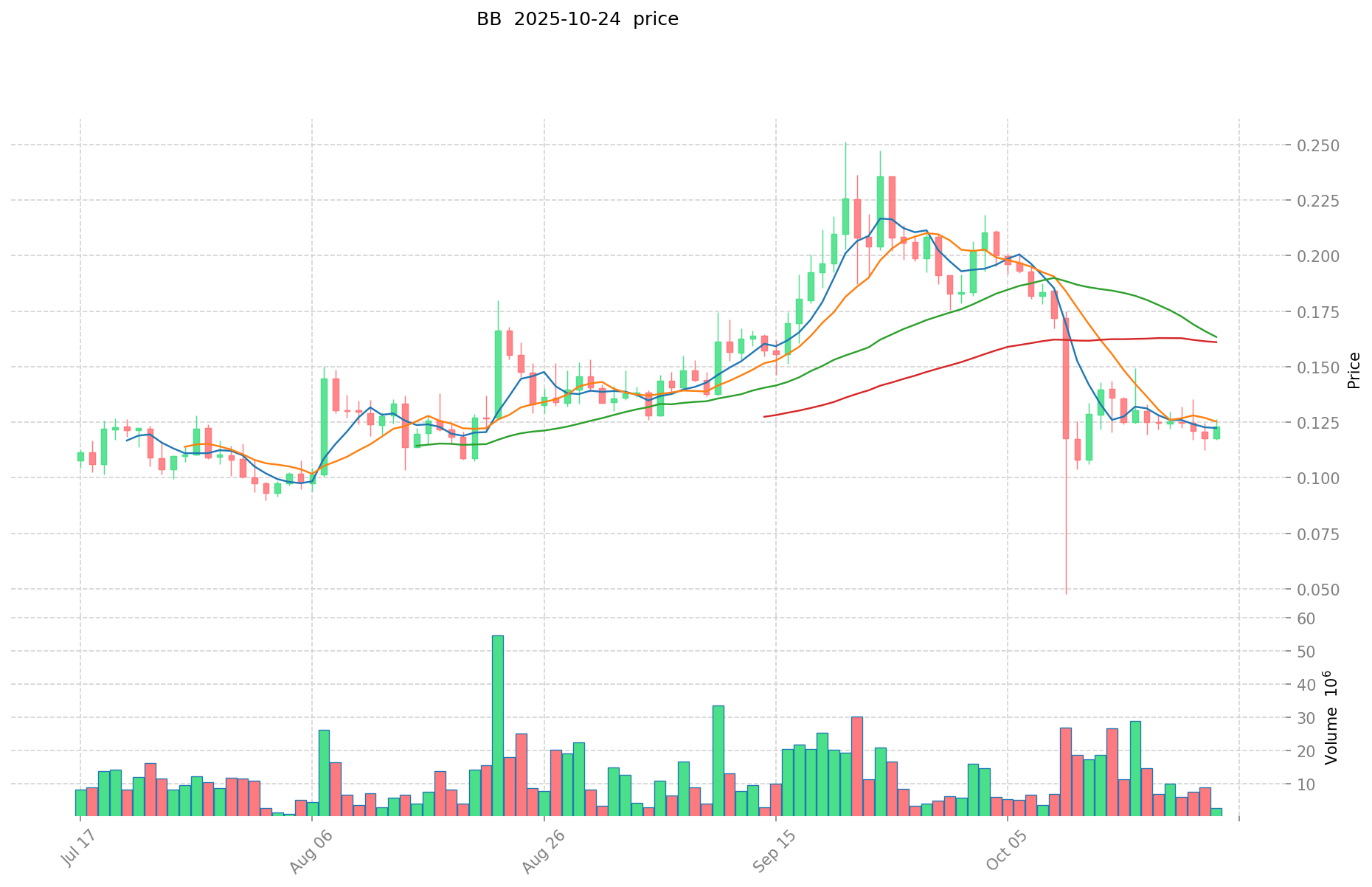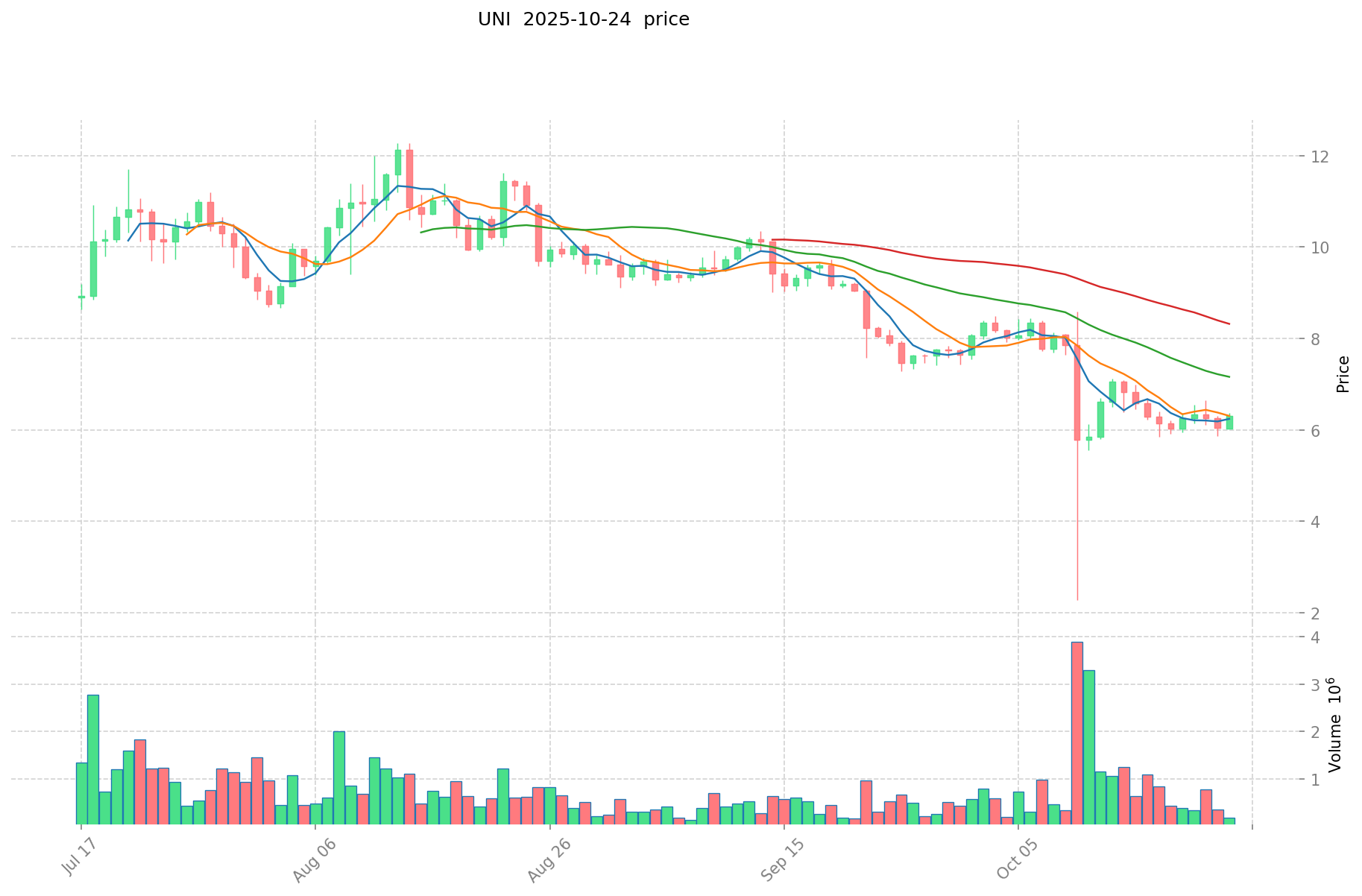BB vs UNI: The Battle for Blockchain Supremacy in the DeFi Space
Introduction: BB vs UNI Investment Comparison
In the cryptocurrency market, the comparison between BounceBit (BB) and Uniswap (UNI) has been an unavoidable topic for investors. The two not only show significant differences in market cap ranking, application scenarios, and price performance but also represent different positioning in the crypto asset space.
BounceBit (BB): Since its launch, it has gained market recognition for its BTC restaking infrastructure and innovative CeFi + DeFi framework.
Uniswap (UNI): Introduced in 2020, it has been hailed as the first automatic market-making protocol on the Ethereum blockchain, becoming one of the most traded and highest market cap cryptocurrencies globally.
This article will provide a comprehensive analysis of the investment value comparison between BB and UNI, focusing on historical price trends, supply mechanisms, institutional adoption, technological ecosystems, and future predictions, attempting to answer the question investors care about most:
"Which is the better buy right now?"
I. Price History Comparison and Current Market Status
Historical Price Trends of BB and UNI
- 2024: BB launched and experienced significant price volatility due to its new market entry.
- 2021: UNI reached its all-time high of $44.92 in May, driven by the DeFi boom.
- Comparative analysis: During the recent market cycle, BB dropped from its high of $0.9 to a low of $0.04755, while UNI declined from its peak of $44.92 to current levels around $6.30.
Current Market Situation (2025-10-24)
- BB current price: $0.12295
- UNI current price: $6.303
- 24-hour trading volume: BB $345,381 vs UNI $1,100,033
- Market Sentiment Index (Fear & Greed Index): 27 (Fear)
Click to view real-time prices:
- Check BB current price Market Price
- Check UNI current price Market Price
<>
二、项目基本面与技术分析
{BB(Coin A)} 项目概况
{UNI(Coin B)} 项目概况
技术指标分析
>
II. Project Fundamentals and Technical Analysis
BB Project Overview
-
Introduction: BB is building a BTC restaking infrastructure for different restaking products.
-
Key features:
- Secured by regulated custody of Mainnet Digital and Ceffu
- PoS Layer 1 with full EVM compatibility
- Dual-token system leveraging native Bitcoin's security
-
Recent important progress: No specific recent updates mentioned in the given information.
UNI Project Overview
-
Introduction: Uniswap is the first automatic market making transaction protocol based on Ethereum blockchain.
-
Key features:
- Decentralized exchange (DEX)
- Automated Market Maker (AMM) model
- Governance token for community decision-making
-
Recent important progress: No specific recent updates mentioned in the given information.
Technical Indicator Analysis
- Support/Resistance levels: BB's current main support is at $0.11705, resistance at $0.12638; UNI's main support is at $6.026, resistance at $6.363.
- Trend indicators: BB short-term trend is upward with a 4.47% 24-hour increase. UNI short-term trend is also upward with a 4.35% 24-hour increase.
- Volatility: BB's recent volatility rate is 7.93% (24-hour high-low range), UNI's is 5.59% (24-hour high-low range).
<>
免责声明:本报告不构成投资建议。投资者应自行研究并承担风险。
<三、投资风险提示
III. Investment Risk Warning
-
Market risk: The cryptocurrency market is known for its high volatility and uncertainty. Both BB and UNI are subject to sudden and significant price fluctuations.
-
Regulatory risk: The cryptocurrency industry faces ongoing regulatory pressures globally. Changes in regulations could impact the operations and value of both BB and UNI.
-
Technical risk: Both projects may face technical challenges. BB, being a newer project, might encounter unforeseen issues in its restaking infrastructure. UNI, despite its established position, could face challenges in scaling and upgrading its protocol.
-
Competition risk: BB faces competition from other BTC restaking and cross-chain projects. UNI, while a leader in the DEX space, competes with numerous other decentralized exchanges and AMM protocols.
-
Liquidity risk: BB, being a newer and smaller cap token, may have lower liquidity compared to UNI. This could lead to larger price swings and potential difficulties in executing large trades without significant slippage.
Disclaimer: This report does not constitute investment advice. Investors should conduct their own research and assume all risks.


II. Core Factors Affecting the Investment Value of BB vs UNI
Credit Ratings and Risk Assessment
- BB: A non-investment grade rating assigned by agencies like Standard & Poor's and Fitch, indicating elevated credit risk with higher default vulnerability during adverse economic conditions
- UNI: Performance evaluated through financial ratios such as P/E ratio, ROI, and EPS based on Universal Store Holdings Ltd's financial reports
- 📌 Historical pattern: BB-rated bonds typically offer higher yields to compensate for their increased risk profile
Investment Characteristics and Applications
- Risk profile: BB-rated bonds are classified as high-yield or "junk" bonds, carrying more risk of default but offering potentially higher returns
- Rating variations: BB+ indicates slightly lower credit risk than BB, while BB- signals slightly higher risk
- Performance metrics: UNI's investment value depends on core financial metrics including Price-to-Earnings ratio, Return-On-Investment, Earnings per share, and Dividend yield
Technical Analysis and Market Indicators
- BB technical indicators: Recent "golden cross" pattern observed in BlackBerry Limited (BB) with the 50-day moving average breaking above the 200-day moving average, potentially signaling a bullish trend
- Price movements: BB showed 6.7% growth over a recent four-week period, possibly indicating momentum
- Market analysis tools: Bollinger Bands (often abbreviated as BB) serve as a technical analysis tool used by investors to identify overbought/oversold conditions and market volatility
Investment Context and Market Positioning
- BlackBerry (BB): Institutional investment patterns show holdings by various funds including cybersecurity ETFs
- UNI applications: For Uniswap (UNI), significance in decentralized trading and its ecosystem applications influence market performance
- Institutional perspective: Brokerage analysts with industry expertise provide valuable insights to institutional investors regarding investment opportunities
III. 2025-2030 Price Prediction: BB vs UNI
Short-term Prediction (2025)
- BB: Conservative $0.10086 - $0.123 | Optimistic $0.123 - $0.1722
- UNI: Conservative $3.28172 - $6.311 | Optimistic $6.311 - $8.33052
Mid-term Prediction (2027)
- BB may enter a growth phase, with expected prices ranging from $0.1201464 to $0.1997028
- UNI may enter a steady growth phase, with expected prices ranging from $7.836141504 to $9.223791562
- Key drivers: Institutional capital inflow, ETF, ecosystem development
Long-term Prediction (2030)
- BB: Base scenario $0.25619563728 - $0.358673892192 | Optimistic scenario $0.358673892192+
- UNI: Base scenario $10.87912951949745 - $13.05495542339694 | Optimistic scenario $13.05495542339694+
Disclaimer: This analysis is based on historical data and market trends. Cryptocurrency markets are highly volatile and unpredictable. This information should not be considered as financial advice. Always conduct your own research before making investment decisions.
BB:
| 年份 | 预测最高价 | 预测平均价格 | 预测最低价 | 涨跌幅 |
|---|---|---|---|---|
| 2025 | 0.1722 | 0.123 | 0.10086 | 0 |
| 2026 | 0.17712 | 0.1476 | 0.143172 | 20 |
| 2027 | 0.1997028 | 0.16236 | 0.1201464 | 32 |
| 2028 | 0.260685216 | 0.1810314 | 0.150256062 | 47 |
| 2029 | 0.29153296656 | 0.220858308 | 0.12368065248 | 79 |
| 2030 | 0.358673892192 | 0.25619563728 | 0.1434695568768 | 108 |
UNI:
| 年份 | 预测最高价 | 预测平均价格 | 预测最低价 | 涨跌幅 |
|---|---|---|---|---|
| 2025 | 8.33052 | 6.311 | 3.28172 | 0 |
| 2026 | 9.0045348 | 7.32076 | 6.7350992 | 16 |
| 2027 | 9.223791562 | 8.1626474 | 7.836141504 | 29 |
| 2028 | 12.43130385783 | 8.693219481 | 5.56366046784 | 37 |
| 2029 | 11.1959973695799 | 10.562261669415 | 6.65422485173145 | 67 |
| 2030 | 13.05495542339694 | 10.87912951949745 | 6.52747771169847 | 72 |
IV. Investment Strategy Comparison: BB vs UNI
Long-term vs Short-term Investment Strategies
- BB: Suitable for investors focused on BTC restaking infrastructure and cross-chain potential
- UNI: Suitable for investors interested in DeFi ecosystems and decentralized exchange growth
Risk Management and Asset Allocation
- Conservative investors: BB: 20% vs UNI: 80%
- Aggressive investors: BB: 40% vs UNI: 60%
- Hedging tools: Stablecoin allocation, options, cross-currency portfolios
V. Potential Risk Comparison
Market Risk
- BB: Higher volatility due to smaller market cap and newer project status
- UNI: Subject to DeFi market fluctuations and overall crypto market sentiment
Technical Risk
- BB: Scalability, network stability of the new BTC restaking infrastructure
- UNI: Smart contract vulnerabilities, potential issues with protocol upgrades
Regulatory Risk
- Global regulatory policies may have different impacts on both, with UNI potentially facing more scrutiny as a well-established DeFi protocol
VI. Conclusion: Which Is the Better Buy?
📌 Investment Value Summary:
- BB advantages: Innovative BTC restaking infrastructure, potential for growth in a relatively new market segment
- UNI advantages: Established position in DeFi, large user base, proven track record
✅ Investment Advice:
- New investors: Consider a smaller allocation to BB for higher risk/reward, larger allocation to UNI for more established presence
- Experienced investors: Balanced portfolio with both BB and UNI, adjusting based on risk tolerance
- Institutional investors: UNI for established market presence, BB for potential growth opportunities in BTC restaking sector
⚠️ Risk Warning: The cryptocurrency market is highly volatile. This article does not constitute investment advice. None
VII. FAQ
Q1: What are the main differences between BB and UNI? A: BB is focused on BTC restaking infrastructure with a dual-token system, while UNI is a decentralized exchange protocol using an automated market maker model. BB is newer with potential for growth, while UNI is more established in the DeFi space.
Q2: Which has performed better historically, BB or UNI? A: UNI has a longer price history and reached an all-time high of $44.92 in May 2021. BB is newer and has experienced significant volatility since its launch. However, past performance does not guarantee future results.
Q3: What are the key risks associated with investing in BB and UNI? A: Both face market volatility, regulatory uncertainties, and technical risks. BB may have higher volatility due to its smaller market cap, while UNI faces competition in the crowded DeFi space. Always conduct thorough research before investing.
Q4: How do the technical indicators compare for BB and UNI? A: As of the current data, both BB and UNI show short-term upward trends. BB has a slightly higher volatility rate of 7.93% compared to UNI's 5.59% over a 24-hour period.
Q5: What factors should I consider when choosing between BB and UNI for investment? A: Consider your risk tolerance, investment horizon, and interest in specific crypto sectors. BB offers exposure to BTC restaking, while UNI represents established DeFi infrastructure. Diversification and thorough research are key to making informed decisions.
Q6: How might future developments in the crypto space affect BB and UNI? A: Advancements in BTC utilization could benefit BB, while the growth of DeFi and decentralized exchanges could impact UNI. Regulatory changes and overall crypto market trends will likely affect both tokens.
Share
Content